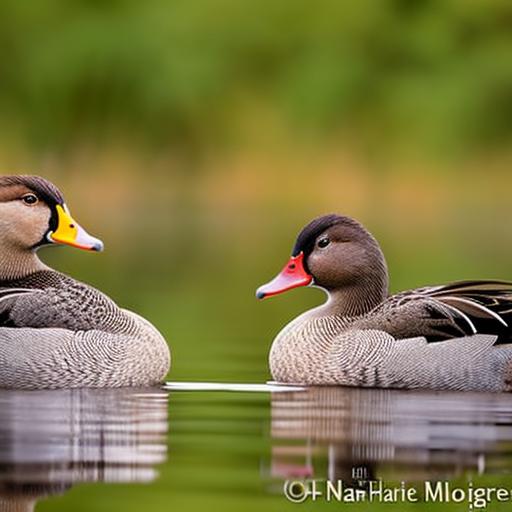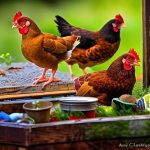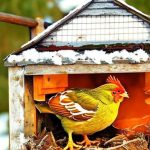Call ducks and chickens are both popular domesticated birds that are often kept together by poultry enthusiasts. Call ducks are a small breed of domestic duck that are known for their distinctive vocalizations, while chickens are a common type of poultry that are raised for their meat and eggs. People keep these two types of birds together for a variety of reasons, including their compatibility in terms of social behavior and their ability to coexist in the same living space.
Key Takeaways
- Call ducks and chickens have different physical characteristics and behaviors.
- Understanding the social behavior of both species is important for successful integration.
- Care and maintenance for call ducks and chickens differ in terms of housing and space requirements.
- Proper feeding and nutrition is crucial for the health of both call ducks and chickens.
- Health concerns and potential challenges should be considered before integrating the two species.
Understanding the Social Behavior of Call Ducks and Chickens
Call ducks and chickens have different social behaviors, but they can still interact with each other in a harmonious way. Call ducks are highly social animals that thrive in the company of other ducks or even chickens. They are known for their friendly and curious nature, and they often form strong bonds with their human caretakers. Chickens, on the other hand, have a hierarchical social structure and establish a pecking order within their flock. However, they can still coexist peacefully with call ducks as long as they have enough space and resources.
When call ducks and chickens are kept together, they may engage in social interactions such as grooming each other or exploring their surroundings together. The call ducks may also learn from the chickens’ foraging behavior and follow them to find food. It is important to note that while call ducks and chickens can get along well, it is still crucial to provide them with enough space and resources to prevent any potential conflicts.
Differences in Care and Maintenance for Call Ducks and Chickens
Call ducks and chickens have different needs when it comes to housing, space, feeding, and nutrition. Understanding these differences is essential for providing proper care for both types of birds.
In terms of housing, call ducks require a shelter that protects them from predators and provides them with enough space to move around comfortably. They also need access to water for swimming, as they are waterfowl. Chickens, on the other hand, need a coop that is secure and well-ventilated, with nesting boxes for laying eggs. They do not require access to water for swimming, but they do need a dust bath area to keep their feathers clean.
When it comes to feeding, call ducks have different nutritional requirements compared to chickens. Call ducks need a balanced diet that includes a mix of grains, vegetables, and protein sources such as insects or commercial duck feed. Chickens, on the other hand, require a diet that is high in protein to support egg production. They can be fed a combination of commercial chicken feed, grains, and kitchen scraps.
The Importance of Space and Housing for Call Ducks and Chickens
Providing enough space and suitable housing is crucial for the well-being of both call ducks and chickens. Call ducks need ample space to move around and access to water for swimming. They also require a shelter that protects them from predators and provides them with a comfortable environment. A pond or a large tub of water should be provided for them to swim and clean themselves.
Chickens also need enough space to move around and exercise. They should have access to a secure coop that protects them from predators and provides them with nesting boxes for laying eggs. The coop should be well-ventilated and have enough roosting space for all the chickens in the flock.
There are different types of housing options available for both call ducks and chickens. For call ducks, a small pond or a large tub of water can be provided for swimming, along with a secure shelter that has enough space for them to move around comfortably. For chickens, a chicken coop with nesting boxes and roosting space is essential. The coop should be predator-proof and provide adequate ventilation.
Feeding and Nutrition for Call Ducks and Chickens
Call ducks and chickens have different dietary needs, so it is important to provide them with appropriate feed and nutrition. Call ducks require a balanced diet that includes a mix of grains, vegetables, and protein sources. Commercial duck feed can be supplemented with fresh vegetables, fruits, and insects. It is important to provide them with enough protein to support their growth and overall health.
Chickens, on the other hand, require a diet that is high in protein to support egg production. They can be fed a combination of commercial chicken feed, grains, and kitchen scraps. It is important to provide them with a balanced diet that includes all the necessary nutrients for optimal health and egg production.
Both call ducks and chickens should have access to fresh water at all times. Call ducks require water for swimming and cleaning themselves, while chickens need water for drinking and bathing in a dust bath area.
Health Concerns for Keeping Call Ducks and Chickens Together

When keeping call ducks and chickens together, there are potential health issues that need to be monitored and addressed. Both types of birds are susceptible to certain diseases and parasites, so it is important to take preventive measures and seek veterinary care when necessary.
Common health issues for call ducks include respiratory infections, parasites such as mites or worms, and nutritional deficiencies. Regular veterinary check-ups and proper nutrition can help prevent these issues. Chickens can also suffer from respiratory infections, parasites, and nutritional deficiencies. Regular cleaning of the coop, proper nutrition, and access to clean water can help prevent these health issues.
It is important to observe the birds closely for any signs of illness or distress. If any bird shows symptoms such as lethargy, loss of appetite, difficulty breathing, or changes in behavior, it is important to seek veterinary care immediately.
Managing Egg Production for Call Ducks and Chickens
Both call ducks and chickens are capable of laying eggs, but their egg production patterns differ. Call ducks typically lay smaller eggs compared to chickens, and they may not lay as frequently. Chickens, on the other hand, are bred for egg production and can lay eggs almost daily.
To manage egg production for call ducks, it is important to provide them with a suitable nesting area where they feel safe and comfortable. They should have access to clean bedding material such as straw or wood shavings. Collecting the eggs regularly can help prevent them from being damaged or eaten by other birds.
For chickens, providing nesting boxes with clean bedding material is also important. Collecting the eggs daily can help prevent them from being broken or eaten. It is also important to provide a balanced diet that includes enough calcium to support eggshell formation.
Integrating Call Ducks and Chickens into a Flock
Integrating call ducks and chickens into the same flock requires careful planning and monitoring. It is important to introduce them gradually and provide enough space and resources for all the birds.
When introducing call ducks to a chicken flock, it is best to start with young ducks that are similar in size to the chickens. This can help reduce any potential aggression or territorial behavior. It is important to monitor the interactions between the birds closely and separate them if any aggression occurs.
Similarly, when introducing chickens to a call duck flock, it is best to start with young chickens that are similar in size to the ducks. Providing enough space and resources such as food and water can help prevent any conflicts between the birds.
Potential Challenges of Keeping Call Ducks and Chickens Together
Keeping call ducks and chickens together can come with its own set of challenges. One potential challenge is the difference in social behavior between the two types of birds. Call ducks are highly social animals that thrive in the company of other ducks or even chickens, while chickens have a hierarchical social structure. It is important to provide enough space and resources to prevent any potential conflicts.
Another challenge is the potential for disease transmission between call ducks and chickens. Both types of birds are susceptible to certain diseases and parasites, so it is important to practice good biosecurity measures and seek veterinary care when necessary.
Additionally, there may be challenges in managing egg production, as call ducks and chickens have different egg-laying patterns. It is important to provide suitable nesting areas and collect the eggs regularly to prevent them from being damaged or eaten.
Tips for Successfully Keeping Call Ducks and Chickens Together
To successfully keep call ducks and chickens together, it is important to provide enough space and resources for all the birds. This includes providing suitable housing that meets the needs of both types of birds, as well as providing a balanced diet that meets their nutritional requirements.
Regular monitoring of the birds’ health and behavior is also important. Any signs of illness or distress should be addressed promptly by seeking veterinary care. Good biosecurity measures should be practiced to prevent disease transmission between the birds.
Introducing call ducks and chickens gradually and monitoring their interactions can help ensure a smooth integration process. Providing enough space and resources can help prevent any potential conflicts between the birds.
In conclusion, keeping call ducks and chickens together can be a rewarding experience for poultry enthusiasts. Understanding the social behavior, care, and maintenance needs of both types of birds is essential for providing proper care and ensuring their well-being. With proper planning, monitoring, and attention to their individual needs, call ducks and chickens can coexist harmoniously in the same living space.
If you’re considering keeping call ducks with chickens, it’s important to understand the dynamics and potential challenges that may arise. One helpful resource to explore is an article on Poultry Wizard titled “Creating a Chicken Coop with Nest Boxes.” This informative piece provides valuable insights on how to design and set up a coop that accommodates both chickens and ducks, ensuring their safety and comfort. Check out the article here for practical tips and expert advice on creating a harmonious living environment for your feathered friends.
FAQs
What are call ducks?
Call ducks are a breed of domesticated duck that are smaller in size compared to other duck breeds. They are known for their distinctive quack and are often kept as pets or for exhibition purposes.
Can call ducks be kept with chickens?
Yes, call ducks can be kept with chickens as long as they are provided with adequate space, food, and water. However, it is important to note that chickens and ducks have different dietary needs and may require different types of feed.
What are the benefits of keeping call ducks with chickens?
Keeping call ducks with chickens can provide a variety of benefits, such as increased egg production, pest control, and entertainment. Ducks are known for their ability to eat insects and other pests, which can help keep the chicken coop clean and free of unwanted critters.
What are the potential drawbacks of keeping call ducks with chickens?
One potential drawback of keeping call ducks with chickens is that they may have different dietary needs and may require different types of feed. Additionally, ducks may be more susceptible to certain diseases that chickens are not, which could potentially spread to the chickens.
What should be considered before keeping call ducks with chickens?
Before keeping call ducks with chickens, it is important to consider factors such as space, dietary needs, and potential health risks. It is also important to ensure that the ducks and chickens are compatible and will not harm each other.
Meet Walter, the feathered-friend fanatic of Florida! Nestled in the sunshine state, Walter struts through life with his feathered companions, clucking his way to happiness. With a coop that’s fancier than a five-star hotel, he’s the Don Juan of the chicken world. When he’s not teaching his hens to do the cha-cha, you’ll find him in a heated debate with his prized rooster, Sir Clucks-a-Lot. Walter’s poultry passion is no yolk; he’s the sunny-side-up guy you never knew you needed in your flock of friends!







